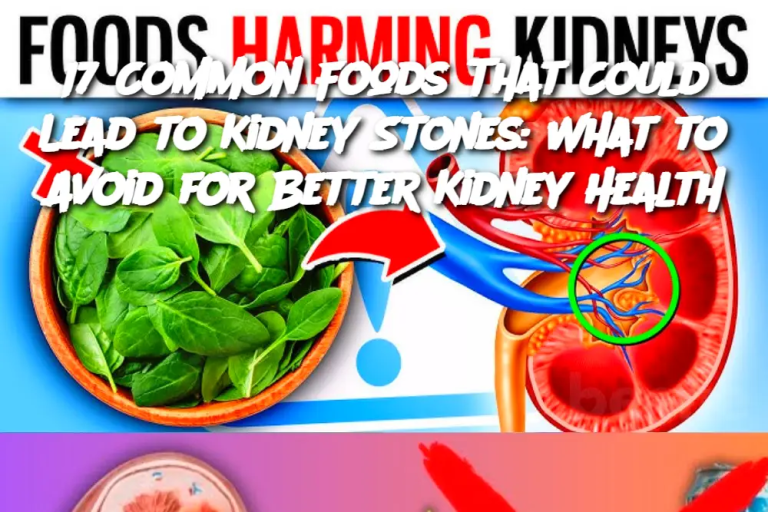ADVERTISEMENT
Introduction:
Kidney stones are painful, frustrating, and sometimes even debilitating. The formation of kidney stones is often influenced by diet, and certain foods can increase the risk of their development. When consumed in excess, these foods can contribute to the formation of kidney stones, which can lead to severe discomfort and even the need for medical intervention. In this article, we'll explore 17 foods that may increase the risk of kidney stones, and why it's important to be mindful of what you eat to promote kidney health.
17 Foods That Can Contribute to Kidney Stones:
Spinach
Rich in oxalates, spinach is a food that can contribute to calcium oxalate kidney stones. People prone to these types of stones should limit their spinach intake.
Rhubarb
Another high-oxalate food, rhubarb can increase the risk of kidney stones when consumed in excess. It is especially risky when eaten with dairy products, as oxalates can bind with calcium.
Beets
Beets contain oxalates that can accumulate in the kidneys and increase the likelihood of stone formation. While healthy in many respects, moderation is key if you're prone to kidney stones.
Nuts (especially almonds and cashews)
Though nutrient-dense, nuts like almonds and cashews are high in oxalates. Consuming too many can lead to the formation of kidney stones in susceptible individuals.
Chocolate
Chocolate is another high-oxalate food that should be eaten sparingly, especially by those who have a history of kidney stones. Dark chocolate, in particular, contains high levels of oxalates.
Wheat Bran
While wheat bran is high in fiber and beneficial in many diets, it can also contribute to kidney stones because of its oxalate content. Those at risk for stones should consume it in moderation.
Cranberries
Although cranberries are often praised for their health benefits, they can increase oxalate levels in the urine, contributing to kidney stones. They should be eaten in moderation by people prone to stones.
Sweet Potatoes
Sweet potatoes contain a significant amount of oxalates. While they are a healthy food choice for most people, those at risk for kidney stones may want to limit their intake.
Cola Drinks
Sugary sodas, especially cola drinks, are known for increasing the risk of kidney stones. The high levels of phosphorus and sugar can lead to an imbalance in the body’s calcium-to-oxalate ratio.
Salted Snacks
High salt consumption can lead to an increase in calcium excretion through urine, which can promote kidney stone formation. Reducing salt intake is critical for preventing kidney stones.
Animal Protein (Beef, Pork, and Poultry)
Diets high in animal protein can cause an imbalance in calcium and uric acid levels, leading to the development of uric acid stones. Limiting red meat consumption may help reduce this risk.
Organ Meats (Liver, Kidneys)
These meats are high in purines, which break down into uric acid. This acid can crystallize and form uric acid stones in the kidneys. It's best to avoid organ meats if you're at risk.
Tomatoes
While tomatoes are a healthy fruit, they contain high levels of oxalates, which can increase the risk of kidney stone formation. Moderation is key.
Processed Foods
Highly processed foods often contain added sodium, preservatives, and unhealthy fats, which can contribute to kidney stone formation. Avoiding processed foods is an effective preventive measure.
Carbonated Drinks (especially Diet Soda)
Artificial sweeteners and phosphates found in carbonated drinks, particularly diet sodas, can contribute to kidney stone formation. Choosing water or natural beverages is a better alternative.
Dairy Products (Full-fat)
Full-fat dairy products like cheese and whole milk can contribute to calcium-based kidney stones in some people. It's best to opt for low-fat versions if you're concerned about stones.
Coffee
While coffee has many health benefits, excessive consumption can increase calcium excretion through urine, leading to kidney stones. Moderation is important for maintaining kidney health.
Ingredients:
Spinach
Rhubarb
Beets
Almonds
Cashews
Dark Chocolate
Wheat Bran
Cranberries
Sweet Potatoes
Cola Drinks
Salted Snacks
Red Meat (Beef, Pork, Poultry)
Organ Meats (Liver, Kidneys)
Tomatoes
Processed Foods
Diet Soda
Full-fat Dairy Products
Coffee
Directions:
While no specific recipe is required for avoiding these foods, the most effective way to prevent kidney stones is through mindful eating and moderation. Here's a simple plan:
Limit or avoid high-oxalate foods like spinach, rhubarb, and beets, especially if you're prone to calcium oxalate kidney stones.
Reduce your intake of animal protein, processed foods, and sugary sodas.
Switch to low-fat dairy products and consider alternatives like almond or oat milk.
Drink plenty of water throughout the day to help flush out excess minerals and reduce stone formation.
Limit high-salt foods such as chips, processed meats, and canned goods.
Serving and Storage Tips:
Opt for a balanced diet rich in fruits, vegetables, and whole grains.
Always check the labels of processed foods for hidden salts, sugars, and preservatives.
Store fresh fruits and vegetables in the refrigerator and consume them within a few days for optimal freshness.
Avoid storing high-oxalate foods in excess, especially if you're at risk for kidney stones, as consuming them in large amounts can contribute to stone formation.
Variations:
ADVERTISEMENT
